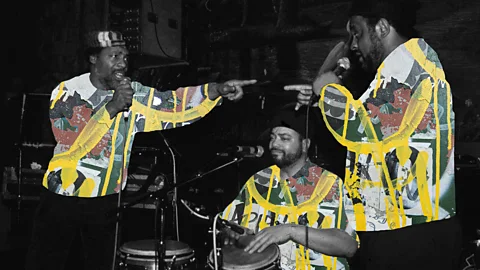The Last Poets and Watts Prophets: The radical hip-hop pioneers 'written out of history'
 Getty Images
Getty ImagesLargely ed as forerunners of hip-hop, the Last Poets, the Watts Prophets and Gil Scott-Heron were radical artists who deserve more recognition in their own right, writes Dorian Lynskey.
It is unclear who was the first person to call Gil Scott-Heron the "Godfather of Rap" but when he died in 2011, at the age of 62, the epithet appeared in most obituaries. A similar honorific has been attached to the group of artists known as the Last Poets, who also began recording street poetry in New York in 1970. Public Enemy's Chuck D made a strong case for the lineage between these poets and hip-hop to the New Yorker in 2010. "They are the roots of rap – taking a word and juxtaposing it into some sort of music," he said. "You can go into Ginsberg and the Beat poets and Dylan, but Gil Scott-Heron is the manifestation of the modern word… In combining music with the word, from the voice on down, you follow the template he laid out."
Perhaps. In of tone, rhythm, content and purpose, however, what these artists were doing, along with the Watts Prophets and Nikki Giovanni, was in a different lane to the party-starting improvisations of MCs at hip-hop block parties a few years later. Back then, to "rap" just meant to talk about something important, hence Isaac Hayes' Ike's Rap monologues or the nom de guerre of Black Power activist H Rap Brown. Hard-edged and ultra-modern, early hip-hop owed little to jazz or poetry. Not until 1988 were MCs such as Schoolly D and the Jungle Brothers able to use new sampling technology to braid their musical DNA with Scott-Heron's and suggest a lineage. In 2005, Kanye West brought the Last Poets back into the public eye on a track he produced for Common and concluded his most important album with a long Scott-Heron sample, using their voices to connect himself to the legacy of 1970s black consciousness.
The original street poets, however, have always been ambivalent about their relationship to hip-hop. Abiodun Oyewole of the Last Poets even sued over Notorious BIG's flippant appropriation of their work in his track Party and Bullshit. Hailing these artists as pioneers of hip-hop is well-intentioned but it risks framing their music as merely a prologue to a much more successful movement rather than a distinctive approach to voice and rhythm, rooted in a particular place and time. "People say we started rap and hip-hop, but what we really got going is poetry," Oyewole told the Guardian in 2018. "We put poetry on blast."
The Big Bang occurred on 19 May 1968, when three young poets came together as the Last Poets in Harlem's Mount Morris Park. Held to mark the birthday of the late Malcolm X, the event took place six weeks after the assassination of Martin Luther King, in a period of crisis for the civil rights movement. "When they killed Dr King, all bets were off," recalled Oyewole, the only member of the confusingly unstable line-up to survive from that first show to their debut album two years later.
 Getty Images
Getty ImagesThe Last Poets were an uncompromisingly radical proposition, fusing the militancy of jazz musicians such as Archie Shepp with poet Amiri Baraka's call for "poems that kill, assassin poems". Pairing stark, declamatory vocals with Afro-Cuban conga rhythms, tracks like When the Revolution Comes denounced both white America and ive black people who were unprepared for the uprising that the Last Poets unquestioningly believed was imminent. The impression that the band was the unofficial musical wing of the Black Panthers was soon confirmed when Oyewole was jailed for an armed robbery on some Ku Klux Klansmen.
Gil Scott-Heron was studying at Lincoln University in Pennsylvania when the Last Poets performed there in 1969. According to Oyewole, he came backstage and said, "Listen, can I start a group like you guys">window._taboola = window._taboola || []; _taboola.push({ mode: 'alternating-thumbnails-a', container: 'taboola-below-article', placement: 'Below Article', target_type: 'mix' });
